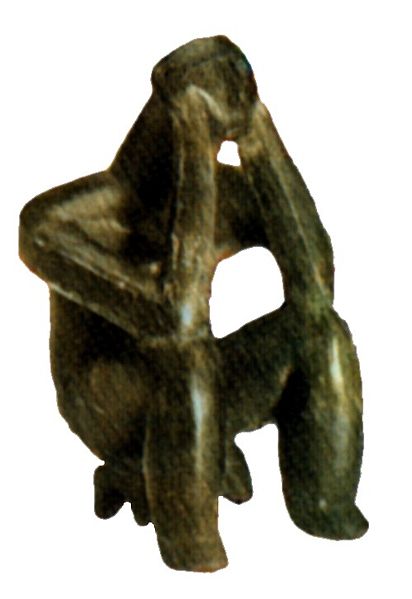 |
| Ganditorul de la Hamagia Romania, cca 5250/5200 BC |
But is psychiatry just another medical specialty?
Historically, psychiatry has been seen as different than other medical specialties. And of course it is: psychiatry studies the mind, while all other specialties study the body.
Due to this difference in focus, physicians entering the field of psychiatry, i.e. students of the body, tend to have a difficult time establishing a coherent professional identity that somehow needs to integrate their expert knowledge of the body with the yet to be understood realms of the mind.
For the philosopher the mind-body problem is a theoretical challenge of major importance. For the practicing psychiatrist in additional to the theoretical importance well acknowledged by countless philosophers the mind-body problem is a foundational issue; as its solution will carry clear pragmatical implications for the psychiatrist way of practicing his trade.
Not surprisingly, a number of psychiatrists end up choosing to stay with the familiar, i.e. practicing a type of psychiatry confined within a biomedical model of the mind and mental illness. Further, the field of psychiatry as a whole, struggling with similar identify issues, has moved away from complex models and now favors a reductionist biomedical mind-brain model.
The biomedical mind-brain solution, in addition to resolving the identity crisis, has an added degree of appeal due to its simplicity. However, while most times simplifying is good and simple solutions are desirable, one needs to remember that over-simplifying is never good and simplistic solutions are always a hindrance.
Understanding the biology of mental process has been essential in terms of both important theoretical advances and practical applications (i.e. the discovery of new treatments) in psychiatry (or more broadly put in neuroscience). However, assuming that every mental process, starting with the building blocks of cognition and ending with consciousness, can be entirely reduced to its underlying biology, might be oversimplifying and as such counter-productive.It appears that one of the important challenges that modern psychiatry faces is separating simple from simplistic.
Thinking along this lines, one can understand why psychiatry shall require a more philosophically grounded apprenticeship and practice than other medical specialties.
To be a good physician one needs to have a solid understanding of his specialty object of study: e.g. the heart for the cardiologist, the blood for the hematologist, etc. Similarly, to be a good psychiatrist one needs to have a solid understanding the brain. However, while brain-expertise might be the end goal for other medically trained brain experts - such as the neurosurgeon and neurologist - brain expertise is only one of the competencies that a psychiatrist needs to master. Specifically, a good psychiatrist, while required to qualify as a brain expert, also needs to meet equal qualifications as a mind expert.
In practical terms, the formation of the modern psychiatrist, following mastery of traditional medical disciples such as anatomy, physiology, pathology, pharmacology etc. in addition to thorough familiarity with the disciplines of psychology, cognitive sciences, and neuroscience, shall include philosophy as the sine qua non jewel of psychiatric expertise.
Why philosophy? And more specifically, what sort of philosophy are we talking about?
Psychiatry is clearly a complex subject. As such, the modern evidence-based philosophy of practice that has become the overarching theme of modern medicine, while necessary, might not be sufficient for psychiatry. In addition to evidence-based appraisal proficiency, psychiatrists also need a philosophy of neuroscience foundation in order to bring together the apparent diverging components of modern psychiatric practice.
Similarly to psychiatry standing at the crossroads of medicine, psychology, sociology, anthropology and ethics, where body meets brain, and brain meets mind, the philosophy of neuroscience is also a subject of major philosophical confluences including epistemology, philosophy of mind, philosophy of science, and moral philosophy.
Such complexity could be overwhelming for the psychiatrist in training. Especially when the trainee already faces a steep learning curve in the science and art of psychiatric interview, nosology-diagnosis, and a variety of interventions ranging from traditional psychotherapy to modern psycho-pharmacology. All these in addition to keeping up with a rapidly changing field of knowledge, where mastery requires frequent learning "updates".
When the plates are already full, is it realistic to propose further increasing the number of required competencies, including a philosophy-based competency?
What we would like to propose is that training in the philosophy of neuroscience is not so much about adding more, but rather about organizing existent knowledge by changing perspective.
Think about it this way. You need to operate a complex machine but you are illiterate. There are many different sets of instructions and you depend on people who are literate to read you the instructions each and every time you need to operate your machine. The instruction manuals are updated frequently and new manuals are also published on a regular basis. You need to master all this information. Your plate is already full. Then your boss comes in one day. He says that in addition to everything else you do, you are now expected to master a new task: you need to learn how to read. You try to explain that it is quite overwhelming just the way it is, implying that you simply cannot add anything else to your already full plate. He tells you that if you will master this new task (i.e. reading) you will find that your plate will actually be less full. By adding reading (a tool/process/skill or active knowledge, as opposed to passive, learnt and stored knowledge) you will actually end up emptying your plate.
This is an illustration of an interesting philosophical paradox where more is less, and addition eventually works out as subtraction.
Similarly to mastering reading, mastering the philosophy of neuroscience is NOT an addition of some additional passive knowledge to an already full storage. Rather, it is mastering of a new set of skills, a new tool, a new way of thinking about things, which will then organize everything else.
© Copyright Adrian Preda, M.D.